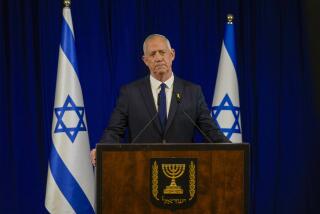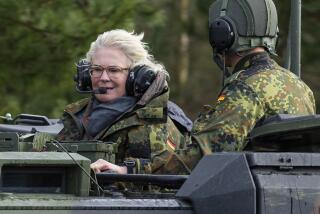Genscher Quits as Germany’s Foreign Minister
- Share via
BERLIN — Hans-Dietrich Genscher, Germany’s indefatigable foreign minister whose policies helped reunite his long-divided nation and shape the flow of European affairs for nearly two decades, announced his resignation suddenly Monday, declaring that he wants to devote time to the country’s growing domestic problems.
Genscher, 65, said he will step down on May 17, 18 years to the day after he took over the job. He is the world’s longest-serving foreign minister.
Only a few hours after the announcement, Chancellor Helmut Kohl said Genscher’s successor will be 50-year-old Irmgard Schwaetzer, a marginal figure on the Bonn political scene with only token experience in foreign affairs.
Her appointment was dictated mainly by the ground rules of Kohl’s three-party ruling coalition, which specify that the job belongs to Genscher’s tiny Free Democratic Party at least through the next parliamentary election in 1994.
Currently serving in her first Cabinet post as Kohl’s minister of construction, Schwaetzer will be the first woman in German history to hold the highly visible foreign affairs portfolio.
“I take on this job as an enormous challenge,” she told reporters shortly after she was selected.
Although news of Genscher’s resignation took the small, inbred political community in Bonn by surprise, it appeared to have been arranged with Kohl, at least in principle, earlier this year.
For Europe and its key partners such as the United States, Genscher’s departure is heavy with significance.
At a stroke, the external affairs of Germany--the country that the Continent likes to fret about most--will slip out of respected, experienced hands into the lap of a largely unknown novice.
Schwaetzer comes to her new job with 16 months’ experience as a Cabinet minister.
A public opinion poll measuring the popularity of prominent Bonn politicians published in the current issue of the leading news weekly Der Spiegel showed that 10% of those questioned were unable to rate Schwaetzer because they didn’t know who she was.
She was educated as a chemist, and her only experience in world affairs came during her four-year tenure as a state secretary in the Foreign Ministry, in which she managed Genscher’s European Community policies.
“She did a good, competent job of it, but she was not creating policy, she was carrying it out,” noted Udo Bergdoll, respected Bonn-based foreign affairs correspondent of the Sueddeutsche Zeitung newspaper.
Aside from her tenure as construction minister, Schwaetzer has no experience in shaping her own policies.
The contrast could not be greater than with Genscher, a man whose sheer energy and constant barrage of proposals frequently set the tone and direction of foreign affairs among Europe’s Western democracies.
“We have to underline the leading role which he played in foreign affairs, not only in Germany but in the construction of Europe as well,” commented Jacques Delors, president of the European Commission in Brussels. “We will miss him a lot.”
Although Genscher had a difficult, sometimes prickly relationship with Kohl, the chancellor Monday heaped praise on the man who held the highest-profile post in Kohl’s cabinets for nearly 10 years.
At a news conference in Bonn, Kohl said Genscher had left his “unique and unmistakable personal signature” on a “vital part” of Germany history.
Genscher said he plans to remain active in Parliament.
“I want to devote myself to strengthening Germany’s internal unity to a greater extent than was possible with my job as foreign minister,” he said.
During his years as foreign minister, Genscher became a master at the art of seeking consensus. During the Cold War, his penchant to seek the middle ground at times exasperated American policy-makers who wanted a more decisive, less equivocal Germany.
His consistent and strong backing of the West European Union (WEU), the nine-member European-only defense group, his desire for closer relations with the former Communist regimes of the Soviet Bloc and his faith in the Conference for Security and Cooperation in Europe (CSCE) as an organization spanning the old East-West divide often drew a mixture of suspicion and derision in Washington.
Although he strongly supported the Western allies’ move to deploy medium-range nuclear missiles in Germany in response to a large Soviet expansion of missiles, he pushed Kohl into opposing any modernization of the American Lance short-range missile. It was the first important German resistance to U.S. defense policy in Europe.
Born in the East German city of Halle, Genscher fled to the west in 1952 and joined the small Free Democrats because he felt there was greater opportunity in a small party.
In 1969, he became interior minister under the country’s first post-World War II socialist chancellor, Willy Brandt, and five years later he was foreign minister.
A firm believer in detente, he was the first Western politician to firmly and openly back the reforms of Soviet leader Mikhail S. Gorbachev.
With the Cold War over and Germany reunited within a Europe headed toward its own integration, Genscher’s vision of the world suddenly seemed a fast-unfolding reality.
Then, just as quickly, things began to go wrong.
The 1991 Persian Gulf War was a nightmare for Genscher. Once diplomacy had failed, he, like Germany itself, seemed paralyzed and incapable of action. To his horror, this inaction suddenly isolated Germany from its closest allies.
He also refused to believe that the Soviet Union could fly apart and clung doggedly to Gorbachev so that once both were gone, he had no backup strategy.
Times staff writer Tamara Jones in Bonn contributed to this article.
A Driving Force in German Politics
Hans-Dietrich Genscher, the longest-serving foreign minister in the world, announced that he will step down May 17 after 18 years in office. At age 65, he is a leader of the centrist Free Democrats, junior partner in Chancellor Helmut Kohl’s coalition government. The Diplomat
* At Home: Genscher is among the most well-known German politicians and a strong voice for better East-West relations and unification of the two Germanys. He was among the first to reach out to former Soviet President Mikhail S. Gorbachev.
* Abroad: Genscher is highly respected but has occasionally been at odds with Western leaders. In 1989, he was at the center of a NATO dispute over short-range nuclear weapons, and he has pressed Western nations to commit to assist the former Soviet nations.
* Politics: In 1982, Genscher played a kingmaker role by leading his party out of a governing coalition with then-Chancellor Helmut Schmidt, a Social Democrat, to support Helmut Kohl. Since then, Kohl has relied on Free Democrats to deliver enough votes to keep a parliamentary majority.
More to Read
Sign up for Essential California
The most important California stories and recommendations in your inbox every morning.
You may occasionally receive promotional content from the Los Angeles Times.













